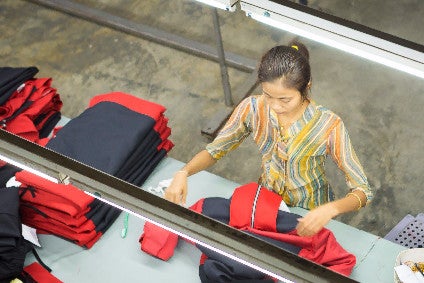
The European Union’s proposed revoking of Myanmar’s Everything But Arms (EBA) trade preference tariffs would leave “thousands of young men and women” jobless, according to SMART Myanmar.
On Monday (29 October), labour organisations from across the country met with European Union (EU) delegates and urged them to reconsider reviewing the trade preference access that allows the developing country tariff-free access to the bloc.

Discover B2B Marketing That Performs
Combine business intelligence and editorial excellence to reach engaged professionals across 36 leading media platforms.
The benefit is under threat from Brussels in response to the alleged ethnic cleansing of Rohingya during a 2017 military campaign.
The EU delegation met with representatives from the Confederation of Trade Unions in Myanmar (CTUM), the Myanmar Infrastructure, Craft and Service (MICS) organizations, and the Agriculture and Farmers Federation of Myanmar (AFFM) in the commercial hub Yangon to discuss the preferential trade arrangement.
According to SMART Myanmar, an EU-funded garments sector project, in 2012 garment export volume growth stood at US$0.9bn. In 2018, projected growth is US$3.3bn. The EU absorbs 47% of its garment shipments, followed by Japan at 27%. It adds there are approximately 1.1m workers across the garment, textile, footwear and accessories sectors in Myanmar, with over 90% of garment workers women.
SMART Myanmar says sanctions imposed on the garment industry 15 years ago resulted in the closure of 150 factories and the unemployment of over 85,000 young people. Many, it adds, were taken advantage of by international sex traffickers and sent to Thailand and elsewhere.

US Tariffs are shifting - will you react or anticipate?
Don’t let policy changes catch you off guard. Stay proactive with real-time data and expert analysis.
By GlobalData“The industry’s isolation closed it off from a global trend of improving social and environmental standards in other countries. The industry languished in isolation. Japanese and Korean markets saved the industry from collapse, but did not adequately address social and environmental standards,” it adds.
Speaking to just-style, Jacob Andrew Clere, a spokesperson for SMART Myanmar explains the country would survive the removal of the EBA by the EU, but the move would result in “thousands of young women and men losing their jobs and having few other economic alternatives.”
“Families would suffer and, rather than contribute to the improvement of human rights in Myanmar, it would actually detract from the development of civil society. I appreciate the EU Commission’s desire to act in response to the horrendous things which have occurred in Rakhine State, but I feel this is not the right way. Engagement with the Myanmar people is needed and a further development of civil society and more economic development is needed.”





